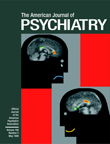Citalopram and Sexual Side Effects of Selective Serotonin Reuptake Inhibitors
To the Editor: The sexual side effects of selective serotonin reuptake inhibitors (SSRIs) may adversely affect compliance. Loss of libido, anorgasmia, and delayed ejaculation in males seem to occur far more frequently than is indicated in package inserts and may affect as many as two-thirds of patients (1). Although SSRIs may differ in propensity to cause sexual dysfunction, this has not been studied in comparative controlled trials. We report two cases in which the highly selective serotonin reuptake inhibitor citalopram did not cause sexual impairment in patients who had experienced such events with other SSRIs.
Ms. A, a medically healthy 65-year-old woman with a history of depression, presented with severe depression, anhedonia, guilt, lack of concentration and appetite, and obsessive thoughts. Despite successful treatment of two earlier depressive episodes with clomipramine, Ms. A refused a regimen of clomipramine because of the sexual dysfunction she had experienced. We prescribed a regimen of fluoxetine, at 40 mg/day, and after 45 days, her depression was resolved. Two months later, Ms. A discontinued her fluoxetine because of side effects including absent libido, anorgasmia, and pain during coitus. Citalopram was initiated and titrated to a dose of 40 mg/day. At 2 months, Ms. A reported no depressive symptoms or obsessive thoughts and no sexual impairment or side effects.
Mr. B, a 58-year-old man with no significant organic disease, received benzodiazepines for 10 years for panic disorder with agoraphobia. In 1992, presenting with moderate depression, Mr. B was prescribed a regimen of fluoxetine, 20 mg/day. After 3 weeks, and despite good response, Mr. B discontinued fluoxetine, complaining of delayed ejaculation and dry mouth. In 1997, presenting with depression, sleep disturbance, anhedonia, decreased libido, and asthenia, Mr. B was treated with a regimen of paroxetine, at 20 mg/day, and temazepam, at 20 mg/day. After 45 days, Mr. B said that he intended to stop treatment, reporting decreased libido, absence of ejaculation, nocturnal priapism with emission of seminal fluid, and emission of seminal fluid on defecation. Treatment was changed to a regimen of citalopram, at 20 mg/day, and temazepam, at 20 mg/day. During the 4 months of citalopram treatment, Mr. B has had no sexual side effects, and his mood and anxiety symptoms have been in remission.
Serotonergic influences on sexual function are poorly understood. SSRIs have been associated not only with impairment of sexual function but with restoration of sexual potency (2). The effects of serotonergic drugs on sexual function may relate to drug dose, serotonin receptor subtypes affected, and the relative effect on serotonergic versus other receptors (1). Citalopram is the most selective SSRI studied (3) and, in our experience, appears less likely than other SSRIs to cause sexual dysfunction (S. Pallanti et al., unpublished report, 1997). Controlled clinical studies are warranted to evaluate the incidence of sexual side effects caused by citalopram and other SSRIs.
1. Modell JG, Kattholi CR, Model JD, DePalma RL: Comparative sexual side effects of bupropion, fluoxetine, paroxetine, and sertraline. Clin Pharmacol Ther 1997; 61:476–487Medline, Google Scholar
2. Smith DM, Levitte SS: Association of fluoxetine and return of sexual potency in three elderly men. J Clin Psychiatry 1993; 54:317–319Medline, Google Scholar
3. Hytell J: Pharmacological characterization of selective serotonin reuptake inhibitors (SSRIs). Int Clin Psychopharmacol 1994; 9(Jan suppl):19–26Google Scholar



